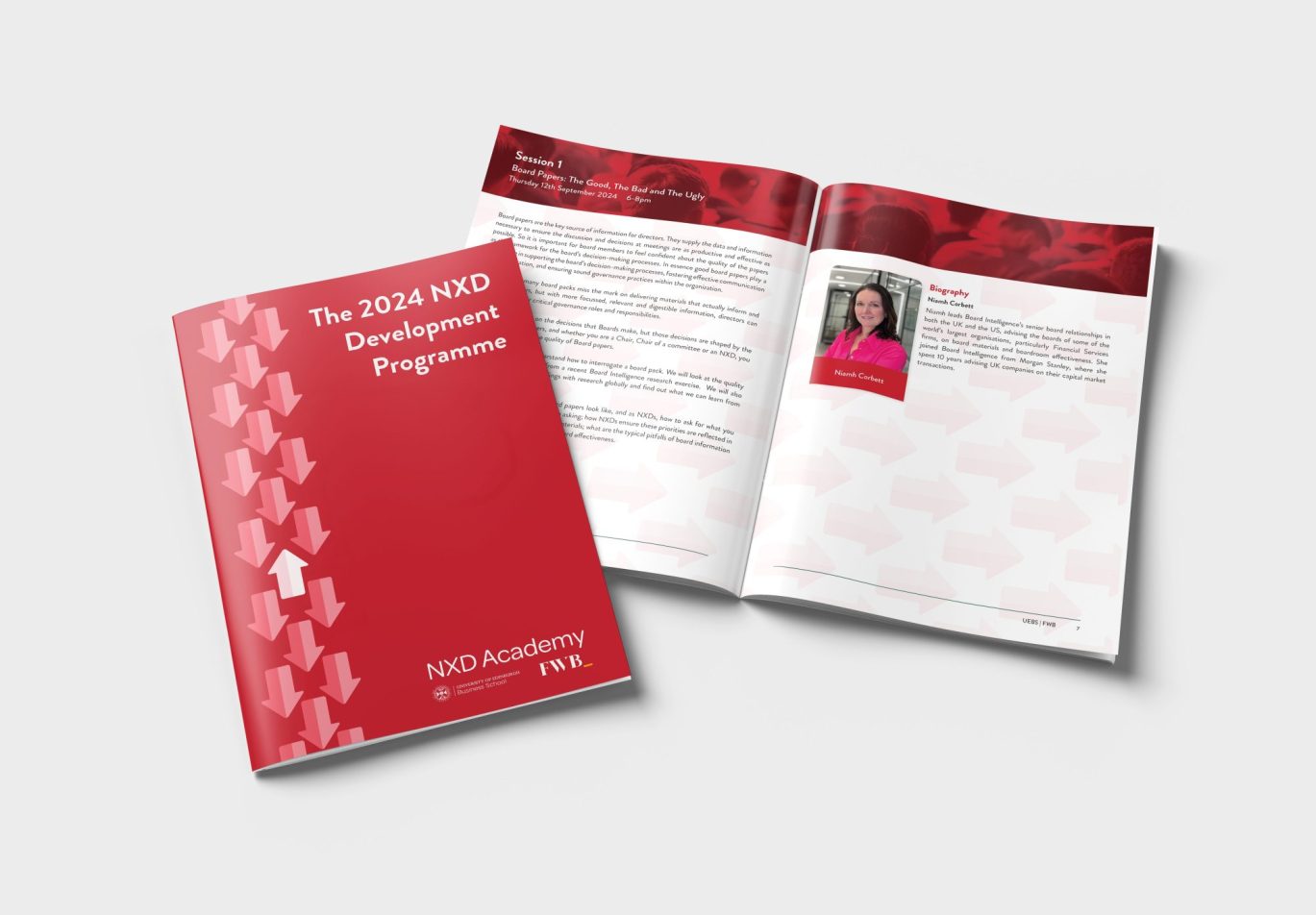Contact the team at FWB to discuss your individual or company requirements, or to discover more about our specialist services.
AI and the Role of Boards
21 October 2024
- Leadership Development

The NXD Development Programme continued with a session on “AI – opportunity or threat? What NXDs need to know” with Louise Smith. AI has become a focal point of discussion in today’s rapidly evolving technological landscape. Lou’s insightful session highlighted the complexities and critical considerations for boards regarding AI. From legacy technology to the rise of data, changing talent expectations, and the convergence of technologies, the landscape is both challenging and full of opportunities.
.
Louise Smith
Louise Smith has undertaken leadership roles in leading organisations across the UK, including digital, data, product, distribution, technology, and operations. This has included delivering the first UK steps into Digital
distribution for a major UK bank, leading the digital transformation during a company’s significant turnaround to profit and being appointed as the first Chief Digital Officer in the history of Lloyd’s of London, shaping the strategy and plan to deliver the world’s most advanced digital insurance marketplace. At the cutting edge of technology, Louise has also led the FinTech Strategy on behalf of the sector and Scottish Government during the Financial Services crisis, including the establishment of FinTech Scotland; was appointed Chair of Innovate Finance – the ‘voice’ of the FinTech community; and currently works with high-growth businesses whilst mentoring at Creative Destruction Labs (Oxford University) supporting the next generation of innovators. She has been recognised as one of the Top 100 UK leaders in Digital, Top 25 leaders in Scotland and Top 100 FinTech Leaders globally. Louise has worked with Boards and senior management on addressing technology issues and opportunities for many years, and chaired boards in this area also, so is well placed to guide our understanding and knowledge, enabling us to add better value and input to our Boards as they grapple with these challenges.

.
.
Positioning AI, Lou talked about the starting point and where we currently are – we have legacy technology, “Projects” that have rolled up – some which worked, some that didn’t. Data has risen up the agenda, but we have to ask if the disciplines are in place; Talent has changed, and their expectations are different; Technology is combining, converging and accelerating; we have “hyper” things now, but have we understood the “pre hypers”; Cyberthreats… the list goes on. Everyone is talking about AI and the “bad guys” are adopting and applying it quicker than we are.
But what is expected of Boards when it comes to AI? Is it an organisational strategy and risk management problem? Is it a human problem – managing the expectation and demand for transparency?
Key Considerations for Boards Regarding AI
Current Use of AI
- Assessment: Boards must understand how AI is utilised within their organisation, from conceptual stages to full operational deployment.
- Benchmarking: Comparing AI usage with competitors can highlight gaps and opportunities.
Industry Disruption
- Potential Impact: AI has the potential to significantly disrupt industries. Boards should explore how and where these disruptions might occur.
- Strategic Planning: Preparing for these disruptions can provide a competitive edge.
Strategic Implications and Risks
- Risk Management: Identifying and mitigating risks associated with AI products and services is essential.
- Opportunities: Leveraging AI for strategic growth while managing associated risks.
Impact on Stakeholders
- Internal and External: Understanding how AI affects employees, shareholders, customers, and partners is crucial for informed decision-making.
- Communication: Transparent communication about AI initiatives can build trust and manage expectations.
Compliance and Governance
- Legal and Ethical: Ensuring AI initiatives comply with legal, regulatory, and ethical standards.
- Governance: Establishing robust governance frameworks to oversee AI use.
Expertise and Inclusivity
- Expert Involvement: Having AI experts on the board or as advisors can provide valuable insights.
- Diverse Perspectives: Including diverse voices in AI discussions can lead to more comprehensive and inclusive strategies.
.
Why AI is Different
Ethics and Privacy
- Fairness and Inclusivity: Ensuring AI systems are fair and inclusive, avoiding biases.
- Privacy: Protecting user data and maintaining privacy standards.
Regulatory Compliance
- Scrutiny: AI initiatives are subject to increasing regulatory scrutiny and require diligent compliance.
Intellectual Property
- Ownership: Clarifying ownership of AI-generated content and protecting intellectual property rights.
Cybersecurity
- Threats: AI systems can be targets for cyberattacks, necessitating robust security measures.
Strategic and Reputational Risks
- Missed Opportunities: Leveraging AI effectively can result in missed strategic opportunities.
- Brand Risk: Missteps in AI implementation can harm an organization’s reputation.
Sustainability
- Environmental Impact: Considering the energy consumption and ecological impact of AI models.
Practical Steps for Boards
- Education and Training: Ensuring board members are educated about AI and its implications.
- Regular Reviews: Regular reviews of AI initiatives and their alignment with organizational goals.
- Stakeholder Engagement: Engaging with stakeholders to understand their perspectives and address concerns.
Conclusion
Lou’s session provided a comprehensive overview of the critical factors boards must consider when navigating the AI landscape and presented several case studies for group discussion and feedback to ensure a practical and interactive session. The session gave delegates a better understanding of what Chairs and NXDs need to know to help protect their organisations while taking advantage of opportunities for growth and success. One of the key takeaways for our NXD Development Programme delegates from this session was ensuring they know the right questions to ask of senior management and around the Boardroom table when it comes to AI.
.
.
Our NXD Development Programme continues with the following sessions:
Session 4 (Thursday 24 October 2024, 6-8pm) – “The opportunity and challenges of being an NXD in a Private Equity backed business”
Session 5 (Thursday 7 November 2024, 6-8pm) – “Energy transition strategies and climate reporting: The escalating challenge for Boards and NXDs”
Session 6 (Thursday 21 November 2024, 6-8pm) – “The Effective Board”
Session 7 (Thursday 5 December 2024, 6pm-8pm) – an in-person event with Bob Brannan (DoubleTree Hilton, Edinburgh)
.
.
For details of the programme and to register for future sessions, please click here.
For enquiries, please email Laura at nxd@fwbltd.com.
.
This is the 7th year of the FWB / UEBS NXD Academy’s NXD Development Programme, which focuses on current challenges and opportunities that Boards are facing. Led by experienced Chairs and NXDs, it is aimed at those interested in all types and sizes of organisations: listed, private, entrepreneurial, SMEs, public sector and not-for-profit. Each session is interactive with small group activities, real-life case studies, plenary discussions, and Q&A. These sessions have been designed to allow plenty of time for interaction and active learning in all areas. Whilst each session has a main topic, the discussions and questions will be wide-ranging.
.

Course Brochure
Download a copy of the course brochure




